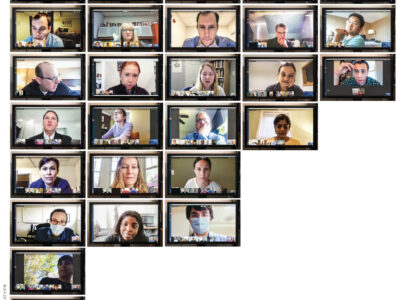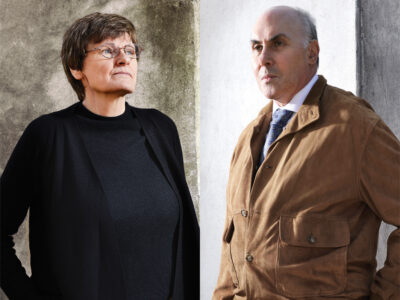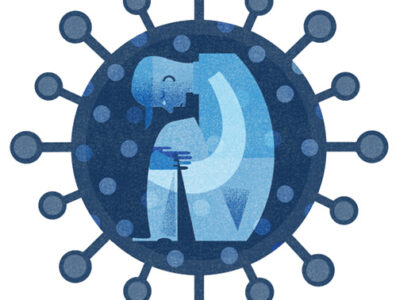Looking ahead to better days—without forgetting what we’ve been through.
By Amy Gutmann
“Philadelphia,” President Franklin Delano Roosevelt once said, “is a good city in which to write American history.” The occasion of that remark came on FDR’s renomination to be his party’s candidate for a second term in 1936. The location, as we all know, was right here at Penn, on Franklin Field. It was in that same speech that the 32nd president observed how human history runs in a seemingly mysterious cycle, bringing his remarks to a thunderous conclusion as he declared: “To some generations much is given. Of other generations much is expected. This generation of Americans has a rendezvous with destiny.”
We know in retrospect, of course, that even though he spoke some years before the outbreak of war in Europe, and fully half a decade before America’s entry into it, FDR’s remarks were eerily prescient. Today, 85 years later, they seem hardly less so. This month, on May 17, I expect to stand proudly—joyfully—on that same Franklin Field where President Roosevelt spoke, to congratulate the amazing undergraduate Class of 2021, a generation that indeed has had its own rendezvous with destiny.
“Joyful” in fact does not begin to describe my feelings at being able to mark the waning of the pandemic with what will be the first mass attendance event held on campus in more than a year. How apt, how appropriate, that it should mark the achievements and the triumphs of these wonderful graduating seniors who arrived at Penn in the sepia-toned days of 2017, a time we now fondly think of as before. They leave Penn to go out into a world haltingly but determinedly returning to normal, but a world that will forever be after—changed and altered in ways we don’t yet know or fully comprehend. Their task, their rendezvous with destiny, will not just be to make sense of it, but to use their skills and their sense to make it better.
In September, the University has called all students, faculty, and staff to a full return to campus. As 2021 gives way to 2022, we look forward (would ‘ecstatically’ be too strong an intensifier here? I think not!) to a resumption of some of the many experiences and traditions that make Penn uniquely Penn. Freshman convocation. The Econ Scream. Toasting Penn football. Packed in the Palestra. Family weekend. Hey Day. Class reunions. Just bumping into someone—literally—on Locust Walk. The list goes on and on.
How tempting it might be to throw ourselves once again into the joy of human contact while giving hardly a thought to what we have all just been through. Read about the great influenza pandemic of 1918—that killed an estimated 675,000 Americans when our population was far less than a third of what it is today—and the thing that jumps out at you is just how fast the memory faded. As one historian put it, “as soon as the dying stopped, the forgetting began.”
And that forgetting, which in many respects appeared intentional, was so very successful. The hue and outcry against Americans wearing masks we all experienced somehow elided right over the fact that there are literally thousands of images of our grandmothers and grandfathers doing just that back in 1918—back in a time when the science of virology was nascent, and the understanding of how to contain and control the deadly influenza outbreak was at best incomplete. Even so, our grandparents knew what they had to do. Yet undoubtedly, the phenomena of open classroom windows, of restaurant dining and church services alfresco, of masks and handwashing and social distancing were not new. They were only new to us. Because somehow we chose not to remember.
This is the thought that needs to stay prominent even as we begin to so happily look ahead to better days to come: that we don’t want to forget. That we must not forget. But to do so, we are going to figure out how we remember. Perhaps here too, FDR was prescient—Philadelphia is a good city in which to write history. And Penn will play a big part in it. Certainly from the very earliest days of the pandemic, Penn was charting a clear and truly historic course of what was to come. From the start—when the question on everyone’s mind was ‘Just what is a coronavirus?’—the world turned to Penn, and the four decades of pioneering research Perelman School of Medicine Professor of Microbiology Susan Weiss had already undertaken into that very question [“The Mother of Coronaviruses,” Nov|Dec 2020]. Weiss’s lab had long been an epicenter of coronavirus research, responsible for training many of the scientists who were suddenly at the forefront of a global race against time. Alumni from her lab became key players in the development of vaccines, in public health preparedness, and in undertaking additional scientific studies of the virus to make it possible to test for and manipulate the viral genome.
Meanwhile, the moment the SARS-CoV-2 genome was sequenced, the dash to create a viable vaccine commenced. Here again, key research many years in the making put Penn at the center of an unprecedented global effort. Decades before this, Penn researchers Drew Weissman and Katalin Karikó began investigating a novel approach to creating vaccines and other medicines by developing synthetic messenger RNA that, when injected into the body, would instruct cells to create specific antibodies to fight against a targeted disease. However, while making sound sense on paper, in practice the procedure always failed because the body’s immune system was highly effective at recognizing the synthetic mRNA and destroying it before it could accomplish its mission. Many years of painstaking and often frustrating research ensued. Then came a key discovery, described in a series of scientific papers starting in 2005, that enabled the scientists to fool the body’s defenses and allow the synthetic mRNA to do its work [“The Vaccine Trenches,” this issue].
This technology—never before successfully employed in medicine—lies at the heart of the Pfizer and Moderna vaccines, two of the first most effective vaccines developed in the fight against COVID and a primary line of defense against the pandemic here in the United States. On December 18, Drew and Katalin received their first dose of the Pfizer/BioNTech vaccine together at Penn, more than 20 years after they began their basic science collaboration.
This is what is expected: to make these vital discoveries; to teach and spread knowledge; and yes, to help us remember. Heather Starkey, a professor of Near Eastern Languages and Civilizations in the College, is doing just that. Working with the Penn COVID-19 Community Archiving Project in the University Archives and Records Center, she has encouraged students in all her classes to write about their experiences at Penn during the COVID-19 pandemic for posterity [“Gazetteer,” Sep|Oct 2020]. Professor Starkey reflects, “Penn survived the 1918 flu pandemic, but we have very few archived sources about what students, faculty, and staff experienced during that time. I hope that the memoirs that students submit to the archives will enable scholars in the future to see how our university persisted—and to extract helpful lessons about surviving and finding meaning through learning and community in a time of adversity.”
How better to sum up the sense of purpose and place that is Penn? Philadelphia may well be the perfect city to write the history and create the memory of what our nation and our world have been through. And I have no doubt our students know it too. Five members of the great Class of 2021 confronted the initial COVID quarantine by deciding that no matter what the restrictions, they too could make a difference. So they organized a nationwide effort to send individual letters of support and appreciation to nurses and doctors caring for the sickest COVID patients. They called their effort Lockdown Letters—a tribute to a unique moment in our history. As I write, more than 13,000 frontline healthcare workers have received messages of hope from strangers who were simply willing to take the time to share their thanks. It’s a small everyday act, but each individual letter is a piece of history. One letter, typical of the many thousands, said simply: “Your dedication, bravery, and courage have not gone unnoticed.”
A century hence, someone will unfold, and read, and remember. This was a generation of which much was expected. A generation that gave its all. A generation that met its rendezvous with destiny. This was Penn.




